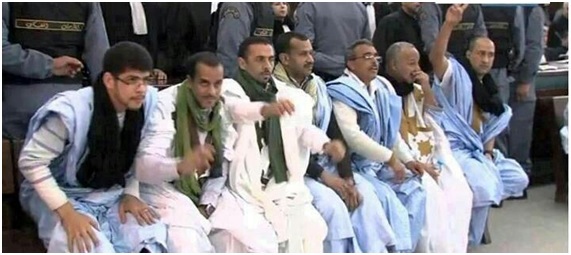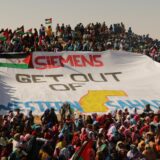De hårda domarna mot Gdeim Izikfångarna

Livstids fängelse eller minst 20 års fängelse blev domarna mot Gdeim Izikfångarna 18 juli.
2013 dömdes 25 västsahariska aktivister till 20 år, 25 år eller livstids fängelse av en militärdomstol i Marocko. De greps i samband med att det fredliga protestlägret Gdeim Izik utanför den ockuperade huvudstaden El Aaiún raserades och brändes ner av marockansk polis hösten 2010. Västsaharierna anklagades bland annat för att ha mördat 11 marockanska poliser. De åtalade uppgav att de hade torterats och tvingats skriva under erkännanden.
Efter många protester och krav från bland annat Amnesty International att de dömda skulle släppas fria eller ställas inför en ny civil domstol inleddes till slut en civil rättegång i Salé utanför Rabat i december 2016. Rättegången sköts upp ett flertal gånger under våren 2017. I juli meddelades den nya domen, som i princip fastställer samma hårda domar som fälldes av militärdomstolen fyra år tidigare.
Uppgifterna om att erkännanden framtvingats under tortyr undersöktes aldrig, något som Amnesty International befarat.
“Rättegången är politisk. Marocko vill med de hårda domarna tysta alla västsaharier som förespråkar ett självständigt Västsahara”, säger Polisariorepresentant.
“Under 6 år har inte Marockos rättsväsende undersökt uppgifterna om att erkännanden skett under tortyr”, säger Amnestyrepresentant.
Ur rapporten Trial Observation Report – The group of Gdeim Izik av Tone Sörfonn Moe och Isabel Lourenco:
…”Sbaai continued telling that he is an ex-political prisoner, and that he was imprisoned due to his political activism, he continued denouncing the abduction of his father by the Moroccan authorities. Sbaai stated that “the Moroccan prisons are a cemetery for the living”. He was detained in 2002 and 2006, always due to his political opinions. He is one of the founders of a Human Rights Association, has worked voluntarily, demanding the right to self-determination and being an observer in the trials of political prisoners. He stated that no prison, nor torture or ill-treatment will change his mind.
He suffered psychological and physical torture, in the gendarmerie he was blindfolded and they asked him about his contacts with Amnesty International. He spent 5 days in sleep deprivation and constant insults. He has a heart condition so the physical torture stopped when they saw that his life was in danger.
He was never asked questions about Gdeim Izik. All the questions were about his political views, his contacts and his voyages abroad. He had to put his fingerprint on the declarations whilst he was blindfolded and handcuffed.”
Läs mer på Western Sahara Resource Watch.





